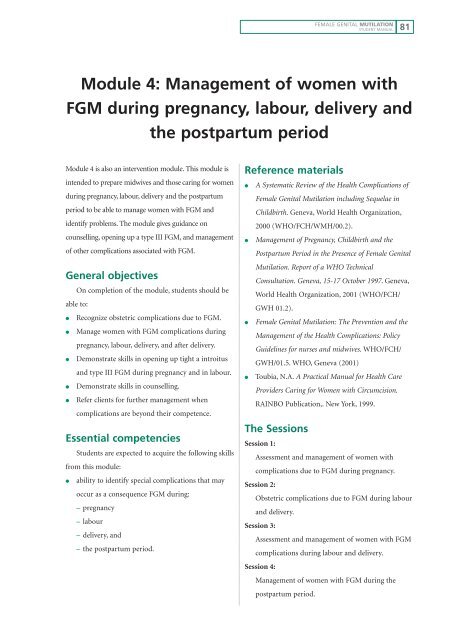Female Genital Mutilation - World Health Organization
Female Genital Mutilation - World Health Organization
Female Genital Mutilation - World Health Organization
Create successful ePaper yourself
Turn your PDF publications into a flip-book with our unique Google optimized e-Paper software.
Module 4 is also an intervention module. This module is<br />
intended to prepare midwives and those caring for women<br />
during pregnancy, labour, delivery and the postpartum<br />
period to be able to manage women with FGM and<br />
identify problems. The module gives guidance on<br />
counselling, opening up a type III FGM, and management<br />
of other complications associated with FGM.<br />
General objectives<br />
On completion of the module, students should be<br />
able to:<br />
● Recognize obstetric complications due to FGM.<br />
● Manage women with FGM complications during<br />
pregnancy, labour, delivery, and after delivery.<br />
● Demonstrate skills in opening up tight a introitus<br />
and type III FGM during pregnancy and in labour.<br />
● Demonstrate skills in counselling.<br />
● Refer clients for further management when<br />
complications are beyond their competence.<br />
Essential competencies<br />
Students are expected to acquire the following skills<br />
from this module:<br />
● ability to identify special complications that may<br />
occur as a consequence FGM during:<br />
– pregnancy<br />
– labour<br />
– delivery, and<br />
– the postpartum period.<br />
Reference materials<br />
● A Systematic Review of the <strong>Health</strong> Complications of<br />
<strong>Female</strong> <strong>Genital</strong> <strong>Mutilation</strong> including Sequelae in<br />
Childbirth. Geneva, <strong>World</strong> <strong>Health</strong> <strong>Organization</strong>,<br />
2000 (WHO/FCH/WMH/00.2).<br />
● Management of Pregnancy, Childbirth and the<br />
Postpartum Period in the Presence of <strong>Female</strong> <strong>Genital</strong><br />
<strong>Mutilation</strong>. Report of a WHO Technical<br />
Consultation. Geneva, 15-17 October 1997.Geneva,<br />
<strong>World</strong> <strong>Health</strong> <strong>Organization</strong>, 2001 (WHO/FCH/<br />
GWH 01.2).<br />
● <strong>Female</strong> <strong>Genital</strong> <strong>Mutilation</strong>: The Prevention and the<br />
Management of the <strong>Health</strong> Complications: Policy<br />
Guidelines for nurses and midwives. WHO/FCH/<br />
GWH/01.5. WHO, Geneva (2001)<br />
● Toubia, N.A. A Practical Manual for <strong>Health</strong> Care<br />
Providers Caring for Women with Circumcision.<br />
RAINBO Publication,. New York, 1999.<br />
The Sessions<br />
FEMALE GENITAL MUTILATION<br />
STUDENT MANUAL<br />
Module 4: Management of women with<br />
FGM during pregnancy, labour, delivery and<br />
the postpartum period<br />
81<br />
Session 1:<br />
Assessment and management of women with<br />
complications due to FGM during pregnancy.<br />
Session 2:<br />
Obstetric complications due to FGM during labour<br />
and delivery.<br />
Session 3:<br />
Assessment and management of women with FGM<br />
complications during labour and delivery.<br />
Session 4:<br />
Management of women with FGM during the<br />
postpartum period.

















